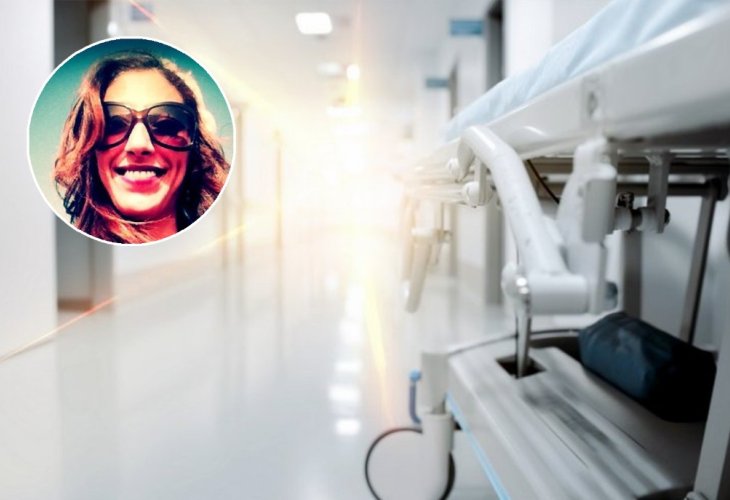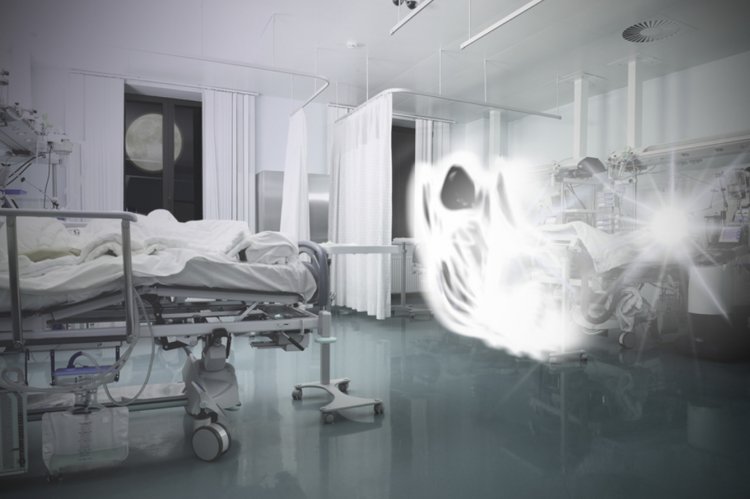The Woman Who Experienced Clinical Death: "I Saw My Mother Praying and Wished She'd Stop Because It Was So Good There"
Six years ago, Hila Baruch, a young and successful lawyer, went through a clinical death that changed the course of her life. "I felt depressed coming back; I wanted to stay there because everything was one, full of mercy and love," she says.
 (Photo: Shutterstock) In the circle: Hila Baruch
(Photo: Shutterstock) In the circle: Hila BaruchSix years ago, Hila Baruch (36) from Even Yehuda, had a near-death experience (a spiritual experience categorized as clinical death) after a routine surgery she underwent. "I underwent surgery to remove a cyst, and during the operation, the doctors left a blood vessel open," Hila recounts. "For three weeks, I was unaware of it; I just thought my pain was recovery pain, while I was actually bleeding internally."
Hila has been a lawyer for ten years, working part-time in the last two years. To her, it seemed like the natural path in life. "I went to law school to use my speaking skills to help people. By the age of 25, I was already a lawyer appearing in court, not just sitting in an office, but something felt off. I had many questions, and I found the answers through the clinical death experience I went through."
 (Photo: Shutterstock)
(Photo: Shutterstock)
"They Were Yelling That I'm Going to Die"
Three weeks after that surgery, while recovering at home, Hila suddenly collapsed. "I was rushed to the hospital, and even there they didn't realize I was losing a lot of blood. For 24 hours, they moved me from test to test, thinking maybe my bladder had burst, but they didn't consider I was bleeding internally. I was so weak and couldn't speak a word. My mother noticed something was wrong and that it wasn't just regular recovery pain, so she started yelling in the corridor for someone to come check me. I won't forget the doctor who came; he was an angel. The moment I saw him, I knew I was in good hands."
Was he the only one who realized something was wrong?
"He entered the room and didn't even look at the protocol but looked directly at me. I have tanned skin and was white as a sheet. My lips, eyes, everything was white. He understood I was losing blood and immediately rushed me for a CT scan, but by then, I could no longer hold on. I started to tremble, fighting for my life."
Hila was rushed to the operating room and says she felt a terror like never before. "They thought I was unconscious, without awareness, but the whole time I heard what was being said around me. They were calling out that I was going to die, and I couldn't understand how this was happening to me. I knew there had to be more to life than what I'd experienced so far."
What did you feel at those moments?
"I felt I was about to die, but I didn't really believe it. Every time I fainted, something strange happened because they thought I was unconscious, but I was completely aware. I just couldn't respond or move my hands, afraid of getting stuck like that. I thought maybe I'd feel trapped inside this body, and no one would know I was awake. Every 20 minutes or so, I'd slip into this state, but I started to fear when the doctors said I was on the brink of death. As I was wheeled into the operating room, I screamed inside: 'I want to live!' I thought to myself it couldn't be that my soul's mission was finished and this was where it ended. When I asked myself if this was the end, I got my answer. I have no way to explain it, but I felt it throughout my entire body."
You mention the concept of 'Tikkun'; where did you even hear about it? Did you grow up in a religious home?
"I grew up in a traditional home but distanced myself from religion. I knew there was a higher power, but I didn't connect to everything surrounding it. I studied in a religious school, but religion felt so external and far from me. I didn't want to do things because I didn't understand why they were done, and no one gave me answers. I was just seen as problematic and exempted from many things, instead of being given answers."
So where did the thought about Tikkun come from?
"My grandfather passed away a few years before the event I went through, and I was very close to him. Even though I distanced myself from religion, when I sat with him, I felt truth and holiness. He made me believe the Torah is truth because he himself was a man of truth. What they taught me in school didn't resonate with me as the things my grandfather taught me. He was a man of humility, of holiness, and if not for him, I would have distanced myself from Judaism even more. It was amazing because, through him, I realized this is the truth and that it's just not told correctly. I saw authority in him and asked him many questions; I remember him explaining to me that we came here to fulfill a Tikkun."
 (Photo: Shutterstock)
(Photo: Shutterstock)
"I Screamed Inside: 'I Want to Live!'"
Hila indeed studied in a religious high school, but she spent most of her life in a secular society due to her love of dance and singing. "I felt like I didn't belong anywhere. Among the religious, I was considered 'the secular one,' and my secular friends called me 'the religious one.'"
You said you received your answer during the experience, what was it?
"I realized I hadn't completed my Tikkun, but I screamed in my heart that I want to live. They woke me up as I was entering the operating room, and I tried to speak. The doctor explained to me that I was in a life-threatening situation and they would do everything to save me. I felt something different. The doctor spoke to me, and he suddenly seemed enlightened and taller. I felt I wasn't afraid anymore and that everything would be okay, whether I live or die. I managed to say the word 'Mom,' and when she entered, I told her: 'Don't worry, everything will be okay. Really.' When my mom left the operating room, I started reciting 'Shir LaMa'alot.' My words came out with pure intent, and I don't even know how I remembered them. I began to say 'Shema Israel,' opened my eyes, and suddenly saw my great-grandmother at the end of the bed, and my two aunts. I felt such peace that they were there with me and understood everything would be okay. The doctor said he would do everything to save me, and I remember telling him I want to remain whole."
Did you feel at those moments that you were hallucinating, maybe?
"Not at all, the things I saw were so clear, unlike anything I had ever experienced. I never thought it was a hallucination. I didn't understand it then, but I was having an out-of-body experience. I was fluttering between life and death, but at the same time, I saw my grandmother in the operating room, the first doctor who operated on me in a cabin in the north, and my mother in the waiting room praying Psalms. I wanted her to let go of me because it felt so good there."
Hila describes her clinical death experience as accompanied by white light. "I felt the unity, that everything was one. I tried to explain afterward what happened there, but I couldn't. It just felt like everything breathed with me together, everything embraced me and loved me, and with every breath, I was tossed into another galaxy. At those moments, I managed to get answers to all the questions I had in life."
Did you feel you want to return to life?
"Returning wasn't an option for me. Everything was full of love and mercy, and I wanted to stay, but they explained it wasn't my time. It took me a long time to get over the depression of life here."
After surgery, Hila awoke excitedly and began sharing things she experienced. In the hospital, however, they thought she was in post-trauma. "They told me: 'Look at you, you're happy.' It was so ridiculous. Because I was happy, they thought I was crazy. And indeed, I was in a sort of 'high,' I started singing songs, but I knew I was sane. I appeared a bit unusual in my behavior, and that's something that's not discussed enough because people are ashamed to admit they don't really want to be here. There's a big gap between what you experienced and reality, and it's very confusing. People talk about the clinical death experience but not about its side effects."

The Easiest Thing Is to Become Religious After a Near-Death Experience
To try to digest the experience she went through, Hila started isolating herself a lot and writing. "Nothing interested me during that time. Most of the time I was alone and tried to write what I went through. It was tough to explain in words an experience beyond words. I was angry that I returned here and didn't have anyone to talk to. No one understood me."
Was there a time you started to doubt what you experienced because of what they told you?
"Not at all. I was just frustrated that I couldn't run in the streets and tell people what I experienced. I realized many people just didn't want to know the truth, which made me withdraw even more."
Hila tried to find a way to understand her new reality and began researching clinical death. "I searched for answers about what I experienced, also in other religions, but it wasn't exactly it. I tried to distance myself from the Torah, but I knew I had no choice." Hila found Rabbi Arik Naveh through her brother and mother who attended his lessons. "I agreed to attend only a few years later. When I arrived, I was amazed to discover someone was finally talking about it, who researched everything I experienced. I suddenly felt someone came and said: 'You're not crazy.' It was a huge gift for me."
So, this is when you started drawing closer to faith?
"I'm still not religious, but I'm in the process, on a path of strengthening. I don't think it's right to do things quickly. It's easiest to become religious after a near-death experience, but I'm taking my time to start everything anew."
Six years have passed since the incident, what have you learned about yourself since then?
"I'm much gentler than I used to be. I've always been a justice warrior, but realized that judgment is very hard for me. If before I was very opinionated, now I'm a woman of peace. I experience life differently, reminding myself that everything is okay and happens according to plan. I also give lectures and share my story with others."
What made you share your story?
"From the start, I knew I had to use my skills for holiness, not for division and wars. I have a lot of information I must share, and I believe we all need to put aside everything that divided us and unite. I believe we're very much on that path. Today I feel I'm doing what I need to do and that I'm not here by accident. My only plan is to follow my soul's plan and carry it out. Additionally, I would like people who experienced what I did to understand they're not crazy, because I was also in that place, feeling alone. Reality was so harsh and confusing, and I felt like I wanted to go back home."
And what about today? Do those feelings still exist?
"Today I'm much more at peace, but still longing."

